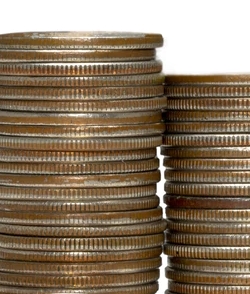Balance a stack of coins on your elbow and then jerk your arm downwards and catch them in your hand. Sounds hard? You will be surprised at how easy it is.

These experiments are from Robert Krampf - The Happy Scientist
This week's experiment is one that I was reminded of while presenting a
teacher workshop on hands-on science in the classroom this Saturday at a
school in Miami. We were going over some of the easy, spur of the moment
things that you can do for science and one of the teachers reminded me of
this one. It is fun and a bit amazing too. You will need:
several coins
space to practice where you won't break anything
OK, here is the idea. You are going to balance a stack of coins on your
right elbow (left if you are left handed) and then jerk your arm downwards
and catch them in your right hand. Sounds hard? You will be surprised at
how easy it is.
First, find a place where you won't break anything if you miss and send the
coins flying. Be sure you have plenty of space to work. Open your right
hand and bring it up so that it is on your right shoulder, with the palm
facing upwards. Start with three coins. Place them in a stack and balance
them on your elbow. Now comes the fun part. You are going to sweep your
hand downwards as fast as you can. Be prepared to close your hand when it
runs into the coins. I know it sounds hard, but try it. It may take a time
or two, but you will be surprised at how easy it really is.
Now, why does it work? As you swing your hand downwards, your elbow moves
downward too. As soon as your elbow moves, the coins begin to fall. At
first, the coins are falling fairly slowly. If you did not catch them, the
pull of gravity would cause them to fall faster and faster as they rushed
towards the ground. In that first instant, your arm is moving much faster
than the coins are falling, so it does not take long for your hand to catch
up with them. Because of the way your arm is built, the coins that were
resting on your elbow are at just the right distance from your body to be in
the path you hand takes. All you have to do is have your hand open and be
ready to grab the coins when your hand runs into them.
Once you have mastered three coins, you can try adding more. It seems that
adding more coins would make it harder, but as long as they will all fit into
your hand easily, it is just about as easy to catch ten as it is to catch
three.
Free printables for multiplication, roman numerals, state capitals, parts of speech, and more.
Math exercises. Multiplication and roman numeral resources. Posters, charts, converters.
Quizzes including world capitals, presidents in order, the elements, state flags, and more.
Armour, castle games, recipes, quizzes, fashions, music, old world maps, medicine, and more.
Alphabet flash cards, printable high frequency words, and printable parts of speech chart.
Spanish numbers to 20 and the Korean alphabet. Printable flash cards and charts.
Science games and quizzes, posters, science experiments.
Free Experiment of the Week from Robert Kramp's Science Education Co.
Posters, printables, the Lifeboat Game, fifty states resources, quizzes.
Reading systems, flashcard, worksheet and test makers, game creators, percentage calculator, timeline template.
Grade school and accredited high school, online public schools, foundational phonics, more.
Stickfigure animations, build a web page and a website template for kids.
Printable guitar and keyboard charts, ukelele chords diagram.
Free books, posters, videos, software, kits, curriculum, courses.
We're finding the good out there and sharing it.
Easy extra money! Lots of info here.
Food intolerance, night flying wasps, and more.
Maille armor pictures, ninja and camouflage pictures, and more.
If you have comments, questions, or would like to report a broken link, please send an email to Cheryl at byclc@live.com
© 2000-2024 Nicholas Academy
site map | privacy policy | by CLC | Micro-Ways